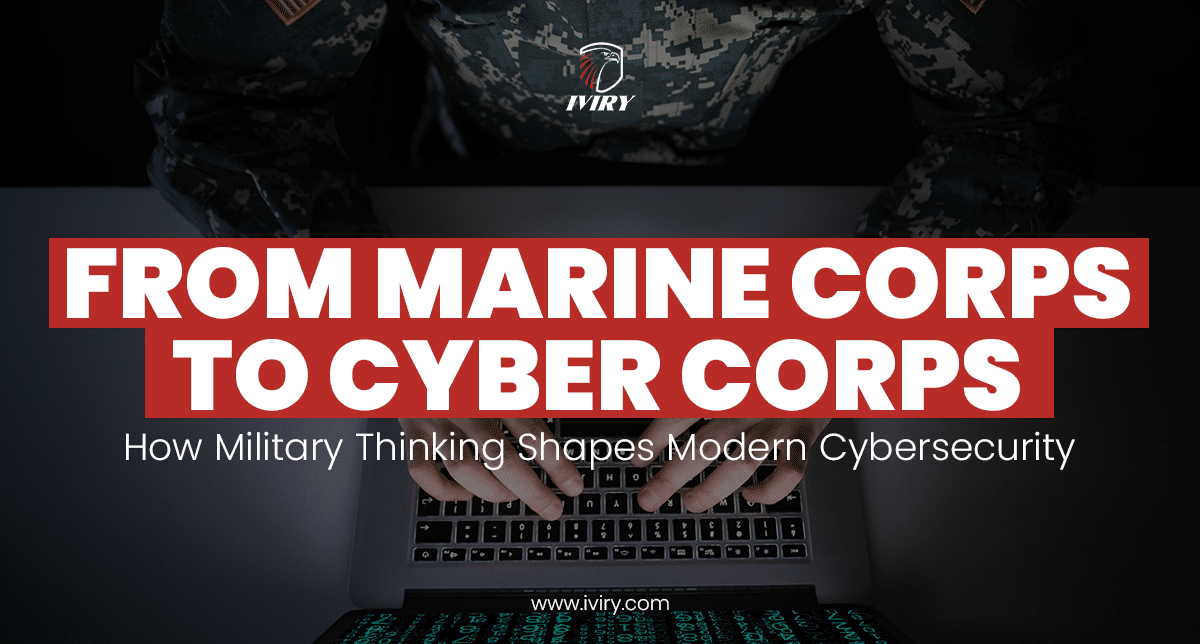Cybersecurity is often framed as a technical challenge — one that can be solved with the right firewalls, monitoring tools, or encryption methods. But anyone who has faced a real-world cyber incident knows the truth: technology is only part of the battle. The mindset behind the defense is equally important.
At Iviry, our leadership and many members of our team are veterans of the United States Marine Corps. The discipline, strategy, and mission-first thinking instilled in the military directly shape the way we approach modern cybersecurity. In fact, the parallels between battlefield operations and cyber defense are striking — and highly relevant for organizations in today’s threat landscape.
Discipline Under Pressure
In military operations, discipline is not negotiable. Every Marine learns to act decisively, follow protocols, and stay calm under pressure. The same is true in cybersecurity. During a breach, hesitation or confusion can escalate the damage within minutes. A disciplined response — guided by well-practiced protocols and clear leadership — can mean the difference between a contained incident and a devastating loss.
This mindset ensures that cybersecurity is not just about building defenses, but about preparing teams to act with confidence when those defenses are tested.
Operational Precision
The military thrives on precision. Every maneuver, every supply line, and every decision is calculated to support the mission. In cybersecurity, operational precision translates into clear processes for patching systems, auditing activity, and maintaining compliance.
Sloppy practices create gaps. Outdated software, weak access controls, or poorly documented policies are like unsecured flanks in a battlefield operation — they give adversaries an opening. A precise, methodical approach eliminates those weak points and builds resilience across the entire organization.
Strategic Foresight
The battlefield teaches leaders to anticipate enemy movements and plan multiple steps ahead. Cybersecurity demands the same. Attackers are constantly evolving their tactics, and defense must evolve faster.
This means organizations cannot simply react to incidents as they happen. They must proactively monitor, test, and strengthen systems with the expectation that threats will come. A forward-looking mindset helps leaders invest in the right protections today to stop tomorrow’s breaches.
The Human Factor
Military thinking also recognizes the importance of the human element. Weapons and technology matter, but missions succeed or fail based on the people who carry them out. In cybersecurity, the same is true. Phishing and social engineering remain the top entry points for attackers — and the strongest defense comes from a workforce that is trained, aware, and engaged.
Building a culture of security is not unlike building a culture of readiness in the military. Everyone, from leadership to the newest recruit, has a role to play.
Cybersecurity as a Mission, Not a Task
Perhaps the most important lesson carried from the Marine Corps to the cyber domain is the sense of mission. For Marines, the mission comes before all else. In cybersecurity, the mission is to protect data, maintain trust, and defend critical systems that keep businesses and even nations secure.
Approaching cybersecurity as a mission — rather than a checklist — shifts the focus from compliance for compliance’s sake to true operational readiness.
How Iviry Brings Military Thinking to Cybersecurity
Iviry’s veteran-led team brings this military mindset into every engagement. We combine technical expertise with battlefield-inspired discipline, precision, and foresight. Our solutions — from CyberMentum™ to managed support services — are designed not only to check the compliance box but to deliver continuous readiness in the face of evolving threats.
We believe cybersecurity is a mission that never ends. And just like in the military, success depends on preparation, discipline, and the will to stay ahead of the enemy.
Leadership That Translates
The transition from Marine Corps to Cyber Corps is not just a career shift — it is a transfer of values. Cybersecurity demands leaders who can think strategically, act decisively, and inspire resilience. These are the same qualities that define military leadership.
As organizations face increasingly complex cyber challenges, applying the lessons of the battlefield to the digital world is not just valuable — it is essential.





